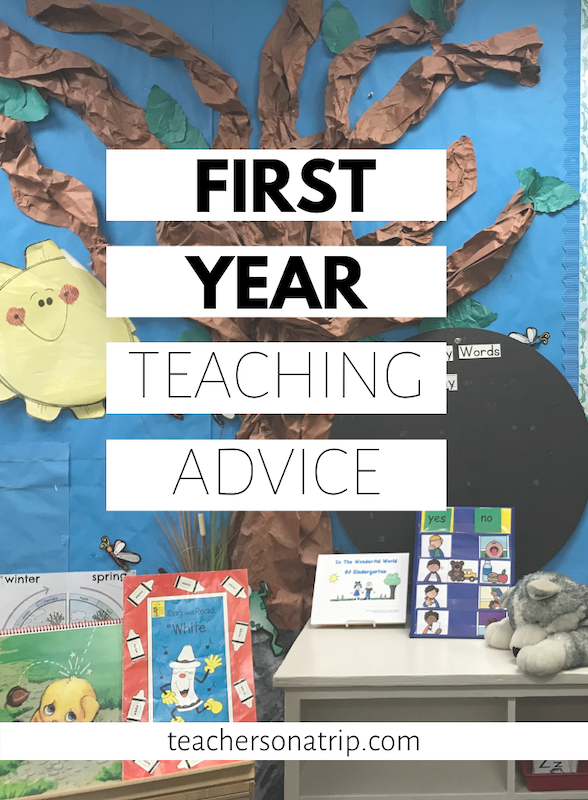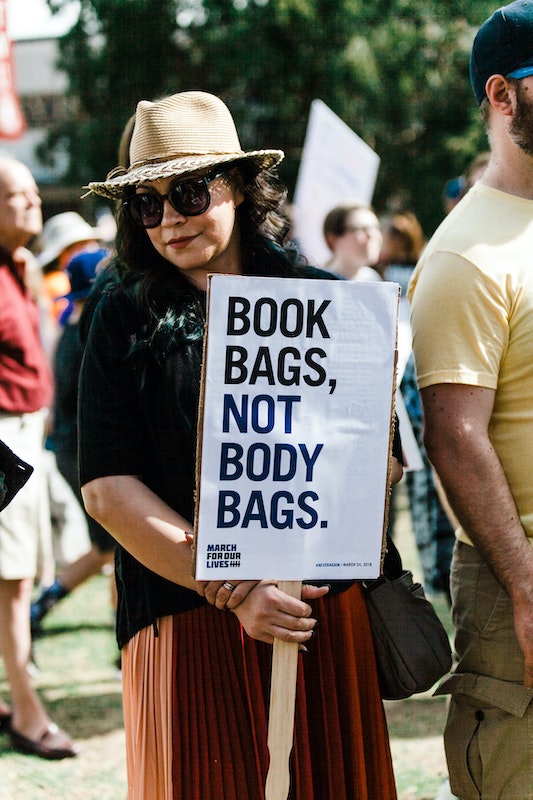
First Year Teacher Advice
Oh gosh. Sitting down to write out first year teacher advice is a bit intimidating. But I just got accepted into grad school this year. Yikes. And as I sat down to write a few narratives for different scholarship applications, I found something unlocked within me about my career. Since the beginning, I’ve always felt that I had something to prove to everybody. I honestly don’t know why I ever thought this. Nobody ever made me feel like I needed to prove myself. But none-the-less, it’s a battle we all face at some point. When one of the applications asked me to reflect on my years teaching, I realized I’ve packed a lot of battles into four short years.
A Recap
During my first year of teaching, I got married and participated in a state-wide school walk out to protest for better public education funding. The marriage part eliminated me from spending any free time on school work because all of my spare moments were filled with wedding preparations and planning. The walk out shut down our school for two weeks while teachers from around the state gathered at the capitol to speak to representatives and protest for educational rights for children. Needless to say, it was a very interesting first year.
During my second year of teaching, I applied and got accepted to teach at one of the best international schools in the world. So my husband and I packed up and moved to Grand Cayman. I started this website and got it off the ground, which was no easy task.
My third year was unlike any other. Our island had multiple dump fires, followed by a 7.7 magnitude earthquake, and then schools closing down due to COVID-19. When other teachers recall that was our first year teaching abroad, they seem to be impressed that we chose to stay. But here we are.
Finally, year four started in school! But we had masks and face shields for a bit. We ended up being allowed to remove them because our island had zero active cases of COVID-19. This year was definitely the most stable of them all. But it still included applying and getting accepted for a different position, as well as getting accepted into my Master’s program in Library Media and Information Technology.
So, after all of that… I’m ready to start year 5! And although it’s only been a few years, I feel like a lot has really been packed into my career. So I want to impart a bit of wisdom on the first year teachers out there. Because even when it seems bad, there is always the light at the end! So let’s kick off my first year teacher advice!

1. Kids Will Be Kids
There is a reason you chose to become a teacher. And hopefully it’s because you enjoy being around humans under the age of 18. But you have to remember that kids will always be kids. Anywhere you go. There will be moments that they frustrate you to no end. But at the end of the day, you have to remember that they are not fully-formed humans. They don’t understand social decency or impulse control yet. That’s what they have teachers for! So before you fly off the handle because one of your students blurted out an answer for the 1000th time, remember that modeling and making connections are the best tools for classroom management.
You cannot expect a child to understand impulse control when you cannot control your own reactions. Instead, remind yourself to enjoy those funny and silly moments. Show the love and get it in return. It’s truly the best part!
2. Don’t Let the Parents Get You Down
If we did a “Family Feud” style teacher game, one of the questions might look like this:
Steve Harvey: “100 teachers were surveyed and the top 5 answers are on the board.. What is the WORST part of teaching?”
Contestant 1: *Buzzes in* “That would be the parents, Steve!”
All the other contestants: *Clapping* “Good answer! Good answer!”
Steve Harvey: “Show me….. The parents!” *ding ding ding* “It’s the number one answer!”

That’s not to say that every parent sucks. Or even that every teacher hates the parents. But it is probably a scientific fact that parents make the job 80% more difficult. At one point or another, there will be an angry parent looking for you. And whether it was your fault or not, you will have to deescalate that situation and hopefully defuse the ticking time bomb before it erupts into mass chaos.
A list of a few of the crazy parents I’ve interacted with over the last four years:
- The denier- The parent that claims their child would never do that. You’re wrong.
- The advantage taker- The parent that thinks you’re younger than they are so they can tell you what to do.
- The accuser- The parent who doesn’t help their children at home, but is still angry at you because their child isn’t on-level.
- The inconvenienced- The parent that is exasperated at you for calling them again because they forgot to pack another lunch.
I actually have real horror stories from my first year. But I’m pretty sure that would be a violation of privacy for me to post them all. The biggest thing to remember (and what I failed to do) is to be confident. The more confident you are in yourself and your abilities, the more confident the parents are in you. And if you stay at the school for more than one year, parents start to recognize you. And that immediately gives you some street cred with them.
3. Brush Up on Educational Politics
You are a teacher, so you are an advocate for your students. End of story. This means you should be up-to-date on what is going on in your community on all levels- local, state, and national. If you’re teaching in a public school, you need to be aware of the school-to-prison pipeline and keep this in mind with every decision you make that affects your students. Also be sure to check out any state or local government regulations or bills in the education sector. Learn how these bills are going to affect your classroom. Are they cutting funding? Where is that extra money going to go if it is not going to the classrooms?
Your students are depending on you. Students of all ages, races, religions, social-economic statuses, and gender-identities. If you are not in this profession for them then what are you doing this for? Protect their rights. Their rights to a quality education and human rights.

4. Use Pinterest as a Tool
Pinterest is an amazing resource! It can be used to find ideas, inspiration, and activities that you wouldn’t have thought to look for! But it has a dark side too. That dark side directly impacts our students, the environment, and our own mental health.
Pinterest’s Impact on Students
Pinterest can affect our students’ mindsets and impact their learning. As a teacher, I’m 100% guilty of looking for worksheets on Pinterest. At the beginning of my career, I loved to print activities. But at one point, I felt like I had too many spare activities. So I started filling space with them all! Anytime we had a down moment? Here’s a paper, kids! But now, I realize there is a lot that can happen in that down time. Time that could have been filled with a worksheet, can be filled with community bonding. It could also be a time to put their quality effort into other more meaningful assignments that take a longer time to finish. I think we can all agree education should focus on quality over quantity. But at the micro-level, it can be difficult to see.
Pinterest’s Impact on the Environment
I’ve been in the trap before: the endless scrolling through all things teacher-based on Pinterest. During college, I would Pin everything I thought I might need. It was typically a lot of school-decor, lessons I thought I might teach at one point, and organizational ideas. I spent the summer leading up to my first teaching job printing off a ton of activities and labels, laminating everything, and purchasing organizational items I would need. I didn’t even stop to think if I was certain this was all useful. Excitement just came over me and all of my logical mind went out the window.
Looking back now, I totally wish I would have just slowed my roll. It would have saved a lot of money, unnecessary waste, and precious resources. I’m typically a pretty rational person. So I can only imagine how many other new teachers are out there that are wanting to have everything Pinterest Perfect, and have wasted so much ink, paper, and plastic on resources they will never use.
Pinterests Impact on Mental Health
Case studies have proven time and time again that social media harms your mental health because it gives you a false perception of the world and your society. Although we might not consider it one, Pinterest is a form of social media. And it is just cramming your face full of photos of picture-perfect teachers and beautiful classrooms that you could only dream of having. This disappointment usually leads to self-doubt and frustration, which has zero reason for creeping into your mind. Because all you did was scroll through an app.
At one of my previous schools, we had a “Pinterest Teacher” who decorated her classroom to the nines. One of those classrooms that looked fantastic in the background of a photo with her feet propped up onto a desk at the end of a Friday saying how exhausted she was. Her teaching was okay. But she was on the pedestal of all pedestals. She ultimately ran the school without being an administrator because of how her classroom appeared to the public. So you can imagine how this changes the dynamic of the school. There was a hierarchy, and her opinion mattered more than anyone else. So teachers are desperate to get on her good side, which causes a rift in the school.
I Don’t Hate Pinterest
I really just dug into Pinterest on that one, didn’t I? But surprisingly, I don’t hate it. I do think it has a dark side. But it also has a good side as well. And when used appropriately, you can really find great ideas and inspirations. But I always have to make sure I’m in the correct mindset before I enter that digital world. Or else, I can easily find myself comparing what I have to others.
So when scrolling through Pinterest, I have a couple of tidbits of first year teacher advice to make sure you’re pinning quality over quantity.
- Don’t pin anything that is unattainable. One day you’ll see a photo of a two-story classroom that has all the furnishings of home, plus amazing learning spaces. Admire it, gaze at it, and then scroll right past it. Do not save it. Because when you sift through your saved Pins to see how you want to redecorate your classroom, seeing that photo will only make you sad at what you cannot have.
- Don’t save any worksheets that are out of your curriculum expertise, old and outdated, or that you already have another activity for that you prefer. If you’re not an art teacher, you don’t need to save complex art ideas. And if you have 30 other single digit multiplication activities that you never use, then you certainly don’t need another. It will just end up getting lost in your jumble and you’ll forget you have it.
- Pin activities that will contribute to better global citizens. If you’re looking for space fillers, then science and social studies are always highly engaging and contribute to a more rational, well-rounded mindset for students.

5. Picture Books Are Appropriate for All Ages
There are some amazing picture books out there. And authors keep writing better ones each year. Now you can find picture books on any subject. They can be such a valuable learning material and have been proven to accelerate comprehension and understanding of a subject. So why do teachers stop reading them after a certain grade level?
My favorites are picture books that talk about complex subjects in way that is easy to understand. Topics like race and diversity, gender-identity, environmental sustainability, lesser-known famous figures, and world cultures. We don’t ever stop teaching these subjects (or at least we shouldn’t), but teachers typically don’t read books about these topics to their high school kids. But we can and should! We can still use picture books in upper-elementary, middle school, and high school. You might get the initial pushback from a few mouthy students each year when you first introduce reading a picture book. But you and I both know all those older students are going to love it, they just don’t want to admit that they love it.
Looking for some high-quality picture books to teach about important global topics? I’ve been curating a few lists on Bookshop. Check some of these out and let me know what you think! If you’re looking to purchase one of these books for your class, I urge you to choose Bookshop over Amazon. In 2021, 81% of Bookshop’s profits went to local bookstores across the United States. It’s a convenient way to still support locally!
6. Take It Slow
This might be one of my biggest pieces of first year teacher advice. There is no need to join every club, after-school activity, and committee during your first year (or ever.) It is okay to say no. Because more than likely, it will be a large time commitment, especially if it takes place after school or on weekends. If you are interested in an extra way to get involved with your school, then I would limit it to only ONE commitment for your first year. This will allow you to understand your new schedule and settle into how the school operates.
I know way too many teachers who stretch themselves thin and have a hard time juggling. When you start to feel like teaching your class is “one more thing to worry about” then you know you have too much on your plate.
7. Find A Good Outlet
If you haven’t stretched yourself too thin (like we talked about above) then you’ll definitely need a good outlet. This is something that you can do after school. It should relax you and allow you to clear your mind from any residual frustrations or anxieties from the day.
Creative Outlets
- Painting
- Sculpting
- Embroidery
- Photography
- Pottery
- Weaving
- Music
- Writing
Athletic Outlets
- Volleyball
- Golf
- Dance
- Weight Lifting
- Running
- Swimming
Self-Care
- Meditation
- Manicure/Pedicure
- Massage
- Bubble Bath
- Tea and a Book
I just wanted to give you a variety of options, but obviously not all outlets are listed. But hopefully this gives you a good idea of what you can do to decompress. I personally have a weekly schedule that I adhere to. Mondays, I go to an aerial acrobatics class. Tuesdays, I come home and work on grad school assignments. Wednesdays or Thursdays, we play beach volleyball or pickle ball. Fridays, we go out with friends. Saturdays are when we typically dive or do something fun. And Sundays are for relaxing and my creative outlets. I can always count on the fact that my week will include a few forms of physical exercise, at least one day of rest, and a day for me to express myself creatively. It helps me get through the tough days at work.

8. You Don’t Need to Prove Yourself
As I mentioned at the beginning, I always felt like I had to prove my self-worth to everybody that I worked with. Maybe it was because I was new and didn’t think they would give me their respect until I earned it. But this caused a lot of stress for me in the first year. Because I always felt like I was one step behind everybody else.
But your only job your first year is to take care of yourself and your students. You truly do not have to worry about anyone else. I’m going to be very clear right now: If you need a few moments to gather your thoughts and maintain your sanity, it’s okay to hand out a boring worksheet. Not being on the same level as a year 10 teacher does not mean you aren’t good at your job. It will take some time, so take the time you need to make sure that you are able to continue showing up for your students every single day.
9. Stay Out of the Teacher’s Lounge
I once saw on Instagram the phrase, “The teacher’s lounge are where dreams go to die.” And I can’t say I disagree. I hope not all faculty lounges are like the ones I’ve experienced. But the schools I’ve been at usually have a group that goes in everyday to talk negatively about something. Sometimes the conversation is about a new initiative the principal is pushing. Other times they are talking about another teacher behind their back. The worst is when I hear them talking about “students they don’t like”. Nothing seems to be confidential in the lounge.
If you’re new to the school and trying to get to know everyone, the teacher’s lounge could be a beneficial place. I’d even recommend spending a week or so in there for lunch to understand the climate. But if you start to get a glimpse that people use the lounge to spread gossip, RUN. Nothing will make you want to leave a school faster than a toxic environment. So if you want to experience longevity at a school, stay away from The Miserables.
10. Keep A Journal
I am the worst at this one, but I really need to start. In the past, I’ve written down the names of my students and a few funny anecdotes from the school year. But imagine have an entire journal filled with the ups and downs. Memories are always so precious. But imagine having one of your old students coming back to say hi, and you remember that special detail about them that happened in your classroom. That’s really special.
Even if you just jot down a couple of moments, you’ll find that you have something enjoyable to show for the time you’ve put into your school.
Related Articles: How to Teach Abroad, What I Quit Doing In My Classroom to Be More Sustainable
I hope this first-year teacher advice helps a little bit. Or maybe just shows you a bit of a different perspective. If you’re a first year teacher, comment down below with some of the questions or worries you have. If you’ve been teaching for a couple of years, comment down below with some other advice you’d like to share!

